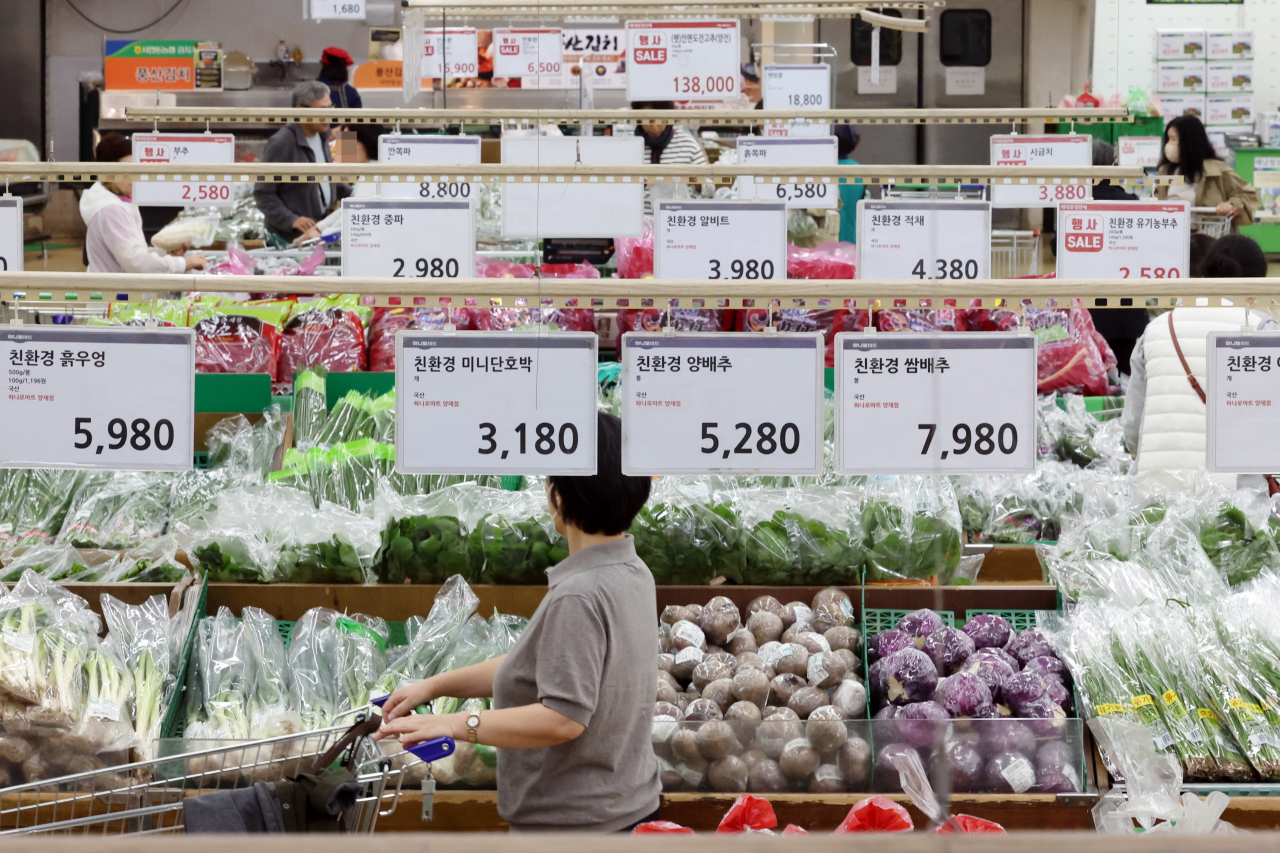 |
Customers shop at a discount store in Seoul on Nov. 2. (Yonhap) |
The International Monetary Fund has upwardly revised its inflation forecast for South Korea to 3.6 percent for this year and 2.4 percent for next year, and advised the country to maintain its current interest rate policy to ensure price stability.
In the IMF’s annual report released by the Finance Ministry on Friday, the IMF projected a 3.6 percent inflation rate for this year, which is 0.2 percentage points higher than the 3.4 percent projected in the IMF's October report.
The IMF's revised forecasts are based on discussions held when Harald Finger, the Korea missions chief at the Washington-based organization, visited South Korea in late August to meet with the Finance Ministry and the Bank of Korea.
The forecast for next year's inflation rate was also adjusted upward, from 2.3 percent in October to 2.4 percent.
South Korea's on-year inflation has gathered pace for the third consecutive month in October, mainly due to greater volatility in global oil prices and rising prices of fresh food items amid unfavorable weather conditions.
Consumer prices inflation fell to a year-low of 2.3 percent in July, but rose to 3.4 percent in August, 3.7 percent in September and further to 3.8 percent in October.
However, the IMF expects the inflationary trend to gradually weaken, forecasting that South Korea will achieve the BOK's inflation goal of 2 percent by the end of next year.
Emphasizing the importance of maintaining the current high-interest rate policy for an extended period to ensure price stability, the IMF advised the country against hasty monetary easing.
Last month, the BOK kept its benchmark interest rate unchanged at 3.5 percent, a level maintained since January 2023. It was the sixth straight freeze, but the level is the highest since 2008.
Meanwhile, the Korean government plans to make comprehensive efforts to address inflation.
"Although the inflation rate in our country is relatively low compared to major nations, the cost of living, as perceived by the public, remains high, and the burden has been increasing due to prolonged high interest rates," President Yoon Suk Yeol said during the 2024 budget speech at the National Assembly in Seoul on Oct. 31.
He added that the government will work on price stability, and strengthen efforts to alleviate the burden caused by the prolonged high interest rates through the expansion of financial support.
As for the growth rate, the IMF's new report maintained its forecasts that came out in October: 1.4 percent for this year and 2.2 percent for next year.
Gradual recovery is anticipated in the second half of this year, driven by rising exports of semiconductors and growth of the tourism industry.
This forecast is on par with the forecast by the BOK, while the South Korean government has anticipated a 2.4 percent expansion next year and the Organization for Economic Cooperation and Development has forecasted a 2.1 percent growth rate.
Since the IMF notes that these figures did not take account of China's economic recovery, further boosts to the South Korean economy are also possible.
Recently, the IMF also adjusted its China forecast, considering the government's stimulus measures, increasing it from 5.0 percent to 5.4 percent for this year and from 4.2 percent to 4.6 percent for next year.
In its report, the IMF also noted that it will make an assessment of South Korea's foreign exchange reserves only with qualitative factors just as it does for other advanced nations starting this year. So far, it has used both qualitative and quantitative factors.
Assessing qualitative factors, South Korea currently has enough foreign reserves to counter external shocks, the organization said.
In a longer-term perspective, the international organization pointed out that South Korea needs to seek structural reforms, such as boosting labor market flexibility, erasing gender inequality in the labor market and reforming the pension system.







![[Today’s K-pop] Blackpink’s Jennie, Lisa invited to Coachella as solo acts](http://res.heraldm.com/phpwas/restmb_idxmake.php?idx=644&simg=/content/image/2024/11/21/20241121050099_0.jpg)